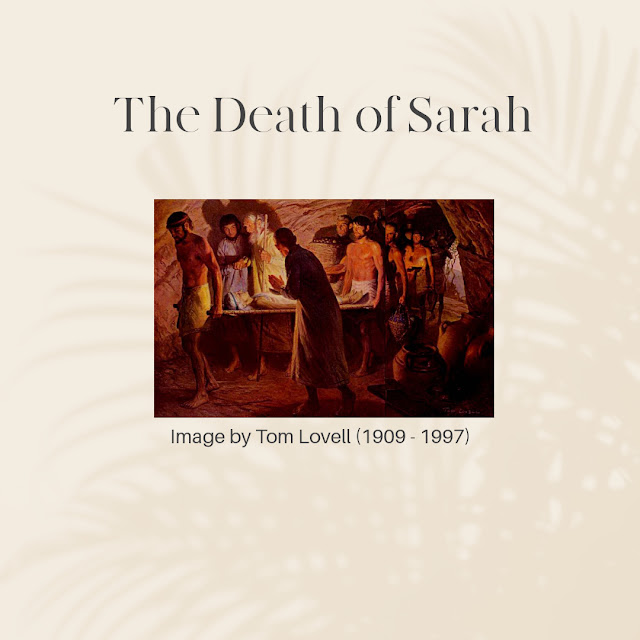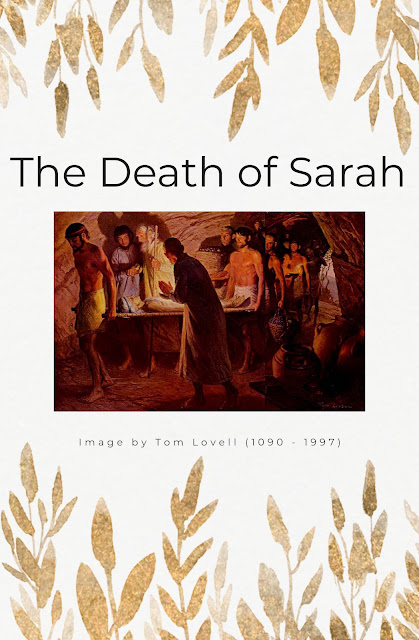 |
| Image by Tom Lovell (1909 - 1997) |
Genesis 23 describes the death of Sarah, Abraham's wife. This chapter of the Bible also describes Abraham's burial plan for Sarah.
The Death of Sarah
Sarah dies at the age of 127 in Hebron. In verse 2, we are told that Abraham mourned and wept for Sarah. Then, Abraham prepares to bury Sarah. Although Abraham was not a native of Hebron, he was apparently well known there. When Abraham approached Heth about a burial site for Sarah, Heth responds:
Hear us, my lord. You are a mighty prince among us. Bury your dead in the choicest of our graves. None of us will refuse you his grave for burying your dead.
Abraham stands up, bows to the people of the land and responds:
If you are willing to let me bury my dead out of my sight, listen to me and plead with Ephron, the son of Zohar, for me that he may give me the cave of Machpelah which he owns which is at the end of his field for the full price, let him give it to me in your presence for a burial site.
Accountability was apparently important to Abraham because this is not the first time he bargained in the presence of others who would witness his agreement or covenant with others.
Ephron offers to give Abraham the field and the cave that is in it free and clear, but Abraham loudly enough so that the people of the land can hear him offers to pay full price for the field.
Ephron tells Abraham that the field is worth 400 shekels of silver. Abraham, in the presence of the people weighs out 400 shekels of silver.
So Ephron’s field, which was in Machpelah, which faced Mamre, the field and the cave which was in it, and all the trees which were in the field, that were within all the confines of its border, were deeded over to Abraham as a possession in the presence of the sons of Heth, before all who entered the gate of his city. After this, Abraham buried his wife Sarah in the cave of the field of Machpelah facing Mamre (that is, Hebron), in the land of Canaan. So the field and the cave that was in it were deeded over to Abraham for a burial site by the sons of Heth. - Genesis 23:17-20
When I first read this chapter, I thought Ephron was offering extreme generosity toward Abraham by offering the field and cave and everything in it for free, but the Believer's Bible Commentary explains the bargaining customs of that time. This explanation sheds a little bit of a different light on the situation.
When Sarah died at one hundred and twenty-seven years, Abraham bargained with the Hittite inhabitants of Hebron for the purchase of the cave of Machpelah as a burial place—his only purchase of real estate during his long life of pilgrimage. The passage gives a priceless description of the bargaining that is so typical in Eastern lands. At first, the Hittites suggested that Abraham choose any one of their burial places. With overflowing courtesy, Abraham refused and insisted on paying full price for a cave owned by Ephron. At first Ephron offered not just the cave but the entire field as an outright gift, but Abraham understood that this was just a polite gesture. The owner really had no intention of giving it away. When Abraham countered by insisting on his desire to purchase it, Ephron suggested a price of four hundred shekels of silver, pretending that this was a great bargain. Actually it was an extortionate price, and ordinarily the buyer would have continued to haggle. So it was a surprise to everyone when Abraham agreed to Ephron’s first asking price. Abraham didn’t want to be indebted to an unbeliever, and neither should we. - The Believer's Bible Commentary
Whether or not Ephron was offering extreme generosity, I'm not sure, but this explanation does show me that Abraham loved Sarah so very much. He knew the field where he wanted Sarah buried and he didn't even try to haggle the price down. He immediately paid Ephron's first asking price.
Read a sermon about Sarah and Her Daughters by Charles Spurgeon.
Did you know that if you visit the Holy Land today, you can visit this very field? You can. Check out See The Holy Land or current information about Ephron's field, now called the Tombs of the Patriarchs, and where this historical place sits today.
The Tombs of the Patriarchs Today in the Holy Land, the Land of Ancient Hebron
 |
| Image Credit: Ooman - CC BY-SA 3.0 via Wikimedia Commons |


No comments:
Post a Comment